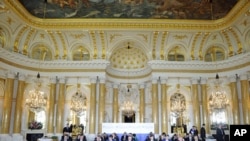U.S. President Barack Obama heads to Poland Friday, on the last stop of a European tour that has seen him in Ireland, Britain and France.
It will be Obama's first visit to Poland, a close U.S. and North Atlantic Treaty Organization ally.
President Obama is expected to spend his two day visit to Poland discussing security and political developments in eastern Europe as well as updating military relations with Warsaw.
Obama's visit begins Friday evening with a meeting with Polish President Bronislaw Komorowski followed by a dinner with central and eastern European leaders.
Polish Foreign Minister Radoslaw Sikorski told local media Friday that a small sub-unit of the US airforce will be deployed on Polish soil. He did not provide any further details.
Until 2009, Poland and the Czech Republic had been slated to host an American anti-ballistic missile shield. But these plans were scrapped. Instead, more mobile SM-3 interceptors will be deployed in Poland, as well as a possible rotation of F-16 warplanes.
Poland's neighbor Russia had balked at the missile defense plan.
Also on the agenda is Poland's reserves of natural gas - of particular interest to U.S. energy companies.
In contrast to the warm welcome President Obama received in other European capitals, former Polish president and fellow Nobel Peace Prize winner Lech Walesa has turned down an invitation to meet the U.S. leader saying it did "not suit" him.
Serbia has decided not to attend the dinner Friday in protest of the presence of the leader of Kosovo. Serbia has not recognized Kosovo's 2008 declaration of independence.
Poland is the final stop in Mr. Obama's six-day tour of Europe that began in Ireland, where the president raised a glass of Guinness beer to his ancestors from the village of Moneygall.
Following that visit, he spent three days in Britain, where he paid a state visit to Britain's monarch Queen Elizabeth and discussed global issues with Prime Minister David Cameron. The president and prime minister agreed that allied military operations in Libya will continue until leader Moammar Gadhafi stops attacking civilians and gives up power.
In France, President Nicolas Sarkozy hosted a two day summit meeting of the world's eight most industrialized countries in Deauville. The so-called Arab Spring uprisings in the Middle East and Northern Africa topped that agenda.
Some information for this report was provided by AP, AFP and Reuters.




